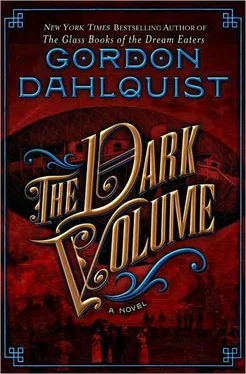Gordon Dahlquist - The Dark Volume
Здесь есть возможность читать онлайн «Gordon Dahlquist - The Dark Volume» весь текст электронной книги совершенно бесплатно (целиком полную версию без сокращений). В некоторых случаях можно слушать аудио, скачать через торрент в формате fb2 и присутствует краткое содержание. Город: New York, Год выпуска: 2009, ISBN: 2009, Издательство: Bantam Books, Жанр: Прочие приключения, на английском языке. Описание произведения, (предисловие) а так же отзывы посетителей доступны на портале библиотеки ЛибКат.
- Название:The Dark Volume
- Автор:
- Издательство:Bantam Books
- Жанр:
- Год:2009
- Город:New York
- ISBN:978-0-553-90603-5
- Рейтинг книги:3 / 5. Голосов: 1
-
Избранное:Добавить в избранное
- Отзывы:
-
Ваша оценка:
- 60
- 1
- 2
- 3
- 4
- 5
The Dark Volume: краткое содержание, описание и аннотация
Предлагаем к чтению аннотацию, описание, краткое содержание или предисловие (зависит от того, что написал сам автор книги «The Dark Volume»). Если вы не нашли необходимую информацию о книге — напишите в комментариях, мы постараемся отыскать её.
The Dark Volume — читать онлайн бесплатно полную книгу (весь текст) целиком
Ниже представлен текст книги, разбитый по страницам. Система сохранения места последней прочитанной страницы, позволяет с удобством читать онлайн бесплатно книгу «The Dark Volume», без необходимости каждый раз заново искать на чём Вы остановились. Поставьте закладку, и сможете в любой момент перейти на страницу, на которой закончили чтение.
Интервал:
Закладка:
WHERE WAS everyone? She picked her way around the machines, to a nest of little rooms, past another two crumpled men in green. Why would the defenders leave their crucial machines so unprotected—were they so desperate, or so confident? Or did they know Mrs. Marchmoor required them in full operation as much as they?
Miss Temple was gratified to find a staircase—wider than normal, which she supposed actually was normal when one had to shift, well, who knew what exactly… material up and down to be worked or lathed or milled or baked—again, details escaped her. But the staircase was as dark as the rest of the factory was bright—lacking windows, lamps, lanterns, even a candle left on a plate. Miss Temple gazed up into the blackness with distaste, the mechanical roar chopping at her concentration and her nerves. Then she perceived something new in the rhythmic din, writhing through the air like a snake… an agonized scream.
The first-landing door was locked tight. The next, up a double length of stairs, was locked as well. She pressed her ear against the door. If the massive beetles below created the rumbling buzz, here was the gnashing, hammering clatter, what she took to be the turbines— the works —of a proper mill. This floor must also hold the cannons— stuffed with soldiers and locked to keep their threat sure. Miss Temple did not care for cannons. It was sixteen steps to the next landing, each one carrying her closer to the keening scream.
But this landing bore a meager light, a tiny tallow stub that allowed Miss Temple to ascend without feeling her way. She let her eyes fix first upon the little hands cupped round it, their skin glowing yellow, and then upon the ghostly small face floating above the flame. Francesca Trapping.
The girl did not speak, and so Miss Temple climbed until their heads were at the same height and did her best to smile, as if the horrid sounds around them were not there, and the simplest thing in the world would be for Miss Temple to lead the child away to safety.
“You are the lady from the house,” said Francesca. Her voice was very small, and her shoulders trembled.
“I am,” Miss Temple said, “and I have come a very long way to find you.”
“I do not like it here,” said the girl.
“Of course not, it is entirely unwholesome. Why are you on the stairs?”
“They have put me out.”
“Are they not afraid you will run? I would run.”
Miss Temple peered more closely at the girl's face, but with just the one candle it was impossible to see if she had been damaged by the glass. Francesca shook her head, her lips pressed so tight together, they nearly disappeared.
“I have been told not to,” she said.
“No sort of reason at all.” The wailing cry worked to undo Miss Temple's composure like a key. “Who is that?”
“I suppose it is him.”
“And I am certain he deserves every second of it too,” said Miss Temple. Beyond the door, the scream bubbled away… and there was nothing but the sound of machines. There was no time. She took Francesca's arm. The girl stood up but did not move to descend.
“O I cannot go!” she said.
“Of course you can.”
“But the Lady said I must stay.”
“I will take you back to your brothers.”
“The Lady doesn't want them. She wants me.”
“What about your mother?”
“But Mama said to stay too.”
“I'm sure she did not mean it. Parents often lie, you know.”
The little girl spoke in a rush, catches in her breath forced through the cracks in her failing courage. “Mama was gone for so long—everyone said we would find her—and when we did find her—we heard her—she did not say anything—anything to me —she only talked to them —and I could not talk— she would not let me—and no one will tell me of Papa—and Mama is so different! Why won't she take me home?”
Miss Temple saw the dried tears across each cheek, and smelled the indigo reek in the girl's hair. “I do not know. But that will not stop us. Come.”
Francesca pointed with the candle toward the door. “We cannot !”
“Nonsense.”
“But the Lady will know! I am only outside to keep watch.”
“Keep watch for what?” asked Miss Temple.
“For you!” said Francesca. “They are all waiting!”
MISS TEMPLE saw a flicker of terror in Francesca's eyes but then just as fast it was gone, and the girl's entire face went blank as stone. The muscles of the tiny arm went slack and the tallow light was dropped, plunging the landing into blackness. Miss Temple still held Francesca's arm, but she knew she could not carry the girl alone, not down the stairs in the dark. Such helplessness was infuriating.
The first wisp of cold flitted against her mind, like a moth past a window.
“Celeste…” the girl whispered.
Miss Temple heard it with revulsion, for in the twisted little voice lay the death of Soames, of Rawsbarthe, the decay of her own body. She squeezed the unresponsive little hand and awkwardly stumbled them both up the last steps to the door. She shifted the pistol and the leather case and found the knob with her fingertips. At its touch the girl gasped and immediately began to whimper.
“Do not be afraid.” Miss Temple's voice was unpleasantly grim. “These people are weak, and weaklings only ever want for whipping.”
She pushed on the door, and the landing was flooded with white light.
THE TABLEAU struck Miss Temple as one of those unsettling dreams, in which figures from quite separate portions of one's life are thrown together, as if cut from paper and pasted together in a frame— the schoolmaster and the housemaid and the garrison soldier and wretched Cynthia Hobart from the plantation on the opposite side of the river, all eating toads on a boat that she herself was expected to steer. In dreams, such unpleasant groupings always appeared to demonstrate some unwanted lesson —that she was too proud, or had been cruel, or covetous of something (always the case regarding Cynthia) in truth beneath her. But what met Miss Temple in the white factory was different, not only because she knew it to be real, but because Miss Temple had finally accepted, despite every determined effort, how impossible it was to avoid consequence. She stepped through the doorway, the girl's hand in hers, with the same awareness of import as when she had first boarded the ship that would take her across the sea, when each hollow knock beneath her heels had echoed the certainty that she would never return. Her entrance brought an end to the business of all these people as surely as a little flaming match sets off a siege gun.
The open room was enormous, its far end fully taken up with bright metal ducts bundled together to feed a line of silver machines. These in turn sprouted black hoses, vibrating with gases and fluid, covering the floor like creepers from an industrial jungle. The shining casings of these machines had been peeled back and white light streamed out, each cracked carapace cradling a nugget of brilliance— super-refined bolts of indigo clay, powering the machines as they had powered the airship. Behind the machines and along each side wall were lines of green-coated soldiers with carbines. The factory's defenders had been withdrawn to this center point, as if to maintain power in this room was to maintain it over all.
On a raised dais, like a carved figure above an altar, perched Robert Vandaariff. Three huge metal plates hung behind the financier from a lattice of chains, like panels in an indecipherable triptych. To each side were placed the buzzing brass box-stands, and at his feet lay long wooden boxes lined with orange felt—the whole arrangement like a bizarre icon for a religion, the deranged alchemy of the Comte d'Orkancz. The Comte's black memories surged within her like hounds against a leash. The scrawls on the metal plates jabbed at her thoughts and she gagged to recognize the ruddy purpled burn that looped around the industrialist's eyes and across his nose. The screams were now explained. Robert Vandaariff had just undergone the Process.
Читать дальшеИнтервал:
Закладка:
Похожие книги на «The Dark Volume»
Представляем Вашему вниманию похожие книги на «The Dark Volume» списком для выбора. Мы отобрали схожую по названию и смыслу литературу в надежде предоставить читателям больше вариантов отыскать новые, интересные, ещё непрочитанные произведения.
Обсуждение, отзывы о книге «The Dark Volume» и просто собственные мнения читателей. Оставьте ваши комментарии, напишите, что Вы думаете о произведении, его смысле или главных героях. Укажите что конкретно понравилось, а что нет, и почему Вы так считаете.












